Events
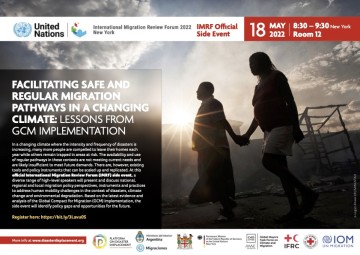
Every year, millions of people are compelled to move in the context of sudden-onset disasters, while the livelihoods of millions more are affected by slow-onset climate change and environmental degradation, with many leaving their homes, and others remaining trapped in areas at risk. Unless such

The GCM has highlighted the importance of multi-stakeholder approaches, including engagement with the private sector together with other non-governmental stakeholders, as part of more comprehensive solutions to migration and development. The resources and unique capabilities of the private sector

The Global Compact for Safe, Orderly and Regular Migration (GCM) contains a promise of participatory processes expressed in its emphasis on a people-centred, human rights based and whole-of-society approach to migration policy4 . Migrants are among the key stakeholders, and their meaningful
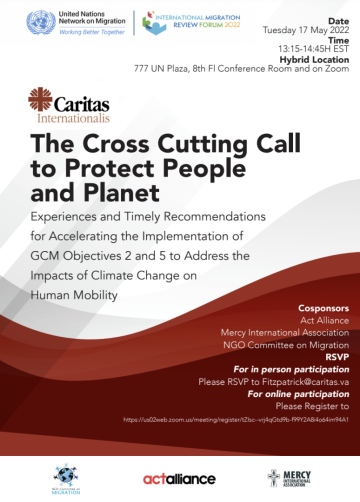
Caritas Internationalis (CI) and its partners will host a 75 minute long hybrid side event during the UN’s International Migration Review Forum (IMRF) both in person at the United Nations Church Center and broadcast live to Zoom, allowing for virtual participation so that all participants of the

Sustainable development is one of the ten cross-cutting and guiding principles of the Global Compact for Safe, Orderly and Regular Migration. The Global Compact is grounded in the 2030 Agenda for Sustainable Development and the Addis Ababa Action Agenda. The contribution of migrants to the

This panel will focus on portable justice, the right and ability of migrants to access justice at all stages of migration. The panellists will share the lessons from migration corridors where civil society has developed accessible, collaborative transnational networks to support migrants in
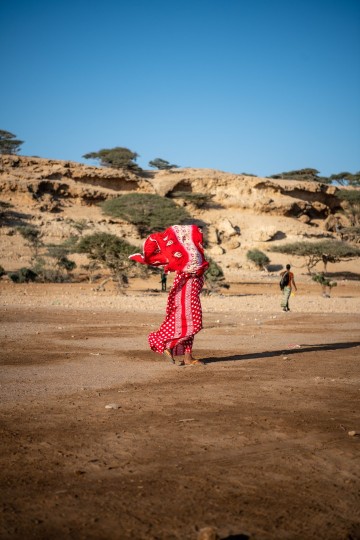
The IGAD region is one of the most vulnerable to climate variability and change in Africa. In 2020, almost 3 million people in the region have been compelled to move in the context of a changing climate. To address this challenge, a regional programme ‘Addressing Drivers and Facilitating Safe
60-minute engaging virtual event with participant interaction in English with interpretation. The event will be co-organised/sponsored by the Initiative for Child Rights in the Global Compacts, and UN agencies and civil society organisations from the Initiative and with the support of two Member
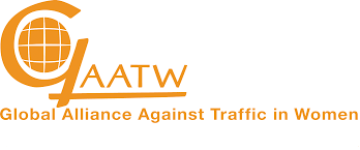
The event aims to share what migrant and trafficked women think of the available state and non-state services designed to promote their re/integration, including whether they are aware of and could access such services, whether they consider them beneficial and, importantly, what measures and

Policy discussions on migration and development focus mostly on host and origin countries. Migrants, however, travel through corridors spanning several countries in their journey, and many migrants remain in the countries they cross for years or never make it to their planned destination at all
In recent years, Latin America has experienced an increase in unplanned migration flows and their level of complexity. Around five million Venezuelan migrants are currently in other Latin America and the Caribbean countries; simultaneously, unplanned migration flows in Central America and Mexico are

Concerns that xenophobia and discrimination are on the rise have sparked a panoply of investments in promoting social cohesion and combatting prejudice against people on the move. These concerns are particularly acute in the wake of rising forced displacement and a global pandemic that triggered

Climate change, environmental crises and disasters disproportionately affect women and girls, in particular those in vulnerable and marginalized situations. In turn, gender inequalities and women’s unequal access to land and natural resources, finance, technology, knowledge, mobility, and other
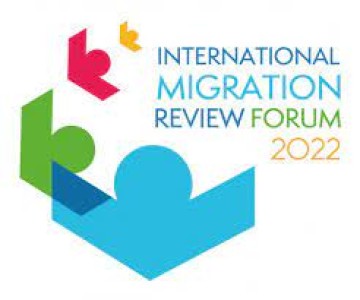
The first International Migration Review Forum (Forum) will take place at the United Nations Headquarters in New York on 17-20 May 2022, hosted by the President of the UN General Assembly. The Forum will be held at the highest possible political level, including Heads of State or Government. It is

Pagination
About the Migration Network Hub
What is the Migration Network Hub?
The Hub is a virtual “meeting space” where governments, stakeholders and experts can access and share migration-related information and services. It provides curated content, analysis and information on a variety of topics.
The Hub aims to support UN Member States in the implementation, follow-up and review of the Global Compact for Migration by serving as a repository of existing evidence, practices and initiatives, and facilitating access to knowledge sharing via online discussions, an expert database and demand-driven, tailor-made solutions (launching in 2021).
Submit your content
What content is displayed in the Hub?
The Hub aims to help you find information on migration, ranging from policy briefs and journal articles, existing portals and platforms and what they offer, to infographics and videos. The different types of resources submitted by users undergo peer review by a panel of experts from within the UN and beyond, before being approved for inclusion in the Hub. To provide guidance to users based on findings of the needs assessment, the content is ordered so that more comprehensive and global resources are shown before more specific and regional ones. Know a great resource? Please submit using the links above and your suggestion will be reviewed. Please see the draft criteria for existing practices here.
Apply to join the Peer Review Roster
Content submitted to the Migration Network Hub is first peer reviewed by experts in the field from both the UN and beyond. Applications are welcomed to join the roster on an ongoing basis. Learn more here.
Contact us
We welcome your feedback and suggestions, please contact us
*References to Kosovo shall be understood to be in the context of United Nations Security Council resolution 1244 (1999).
Newsletter
Subscribe to our newsletter.